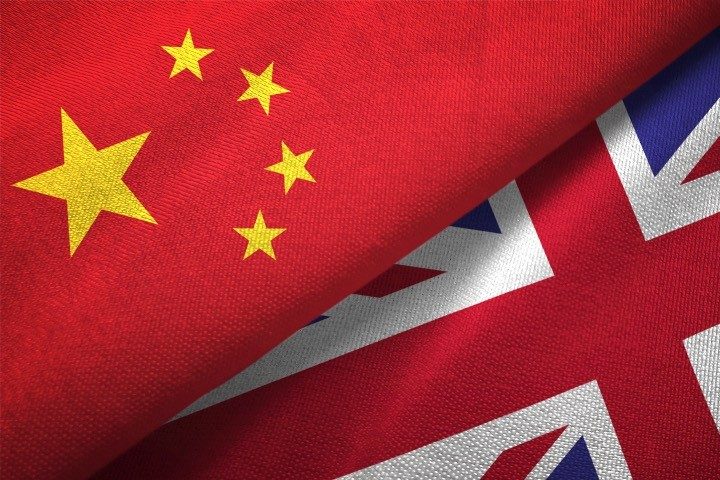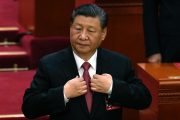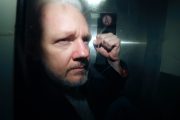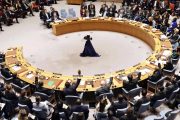
SINGAPORE — China has recalled six officials from the U.K. whom police planned to question over their reported violent treatment of a man. The alleged victim, who was protesting outside the Chinese consulate in Manchester in October, said he was kicked and punched while doing so, according to British Foreign Minister James Cleverly.
Cleverly said the officials, including the consul general in Manchester, were called home by China following a police request to interview them over the incident. “I am disappointed that these individuals will not be interviewed or face justice,” Cleverly said in a written statement. “Nonetheless, it is right that those responsible for the disgraceful scenes in Manchester are no longer — or will shortly cease to be — consular staff accredited to the UK.”
Police had been probing the alleged attack on Bob Chan from Hong Kong, who protested against Chinese President Xi Jinping. Chan was reportedly assaulted by some men after being dragged inside the grounds of the consulate.
“Images carried on social media showed what appeared to be completely unacceptable behavior by a number of individuals near the entrance to the consular premises,” said Cleverly, who summoned the acting ambassador over the incident. He also said that the embassy had been notified and given the chance to respond, and that the police had requested that the six Chinese officials waive diplomatic immunity to be interviewed.
However, “In response to our request, the Chinese government has now removed from the UK those officials, including the consul general himself,” Cleverly told broadcasters. The chair of the U.K. Parliament’s Foreign Affairs Select Committee, Alicia Kearns, remarked that the government should bar the officials from ever returning to Britain.
China lampooned the British government for not fulfilling its responsibilities under international law to safeguard its consulate premises and staff.
The communist regime also claimed that its Manchester consul general had been sent home because of a rotation of officials. “The Chinese consul general in Manchester has completed his term of office and has returned to China upon instruction not long ago,” a Chinese embassy spokesperson said in a statement posted on Twitter. “This is a normal rotation of Chinese consular officials.”
Greater Manchester Police pledged in a statement that it would persist in investigating the events surrounding the October protest, which occurred on the first day of the congress of the Chinese Communist Party in Beijing, at which Xi secured a historic third leadership term.
Both sides hotly contested the events that transpired during the Manchester confrontation, but the episode was filmed by multiple people.
Videos posted by Hong Kong pro-democracy protesters outside the Manchester consulate reveal four Chinese officials departing the premises to tear down posters mocking Xi. Two of the staff members were shown with riot gear, including helmets and vests.
Protesters responded furiously, and a scuffle started.
The Chinese consulate claimed one of the protesters “grabbed a member of consular staff by the neck and refused to let go,” and “in an effort to free the staff member, other members of staff pulled their colleague into our compound.”
However, two separate videos posted online show clearly that Chinese officials dragged Chan into the premises of the consulate, where they punched and kicked him.
British police then temporarily entered the embassy grounds to pull Chan out.
The Chinese consulate has publicized its own version of the struggle from its CCTV camera and claims that its officers were only defending themselves from violent protesters. One of the Chinese diplomats, Gao Lianjia, told reporters that he was choked by a protester who, he alleged, had knocked him over and attacked him: “I was standing close to the front gate when all of a sudden the protester knocked me down by running against my belly…. In a split second, he grabbed my collars tightly and knelt forcefully on my body with my back on the ground. I struggled, but to no avail. I had difficulty breathing and lost consciousness.”
A video of the scene does seem to depict that Gao was knocked down when Chan was dragged into the compound. Chan seemed to be on top of the Chinese diplomat, but it remains unclear if Chan attacked him in any way, or if Gao became unconscious.
Although the videos online do depict that some protesters were involved in violence, kicking a Chinese diplomat in the head three times after he collapsed during the confrontation, Chan denied any claims of violence and told journalists in London that he was traumatized by the “barbaric” assault that resulted in bruises to his face, head, neck, and back.
It is noteworthy that Gao, the Chinese diplomat involved in the aforesaid violent tussle, was also implicated in attacking Taiwanese officials in Fiji two years ago. According to media reports, he was one of the two Chinese diplomats who made headlines in 2020 when they allegedly attacked a Taiwanese representative outside the Grand Pacific Hotel in Fiji’s capital, Suva. A photograph depicted Gao outside the Grand Pacific Hotel right before the melee.
In 2020, Taiwanese diplomats and officials were hosting Fijian politicians, officials, and community members at a reception to commemorate the country’s national day when, according to Taiwan’s Foreign Ministry, the two Chinese diplomats turned up uninvited at the Grand Pacific Hotel event and tried to photograph participants.
When Taiwanese officials confronted the diplomats outside the venue, the latter responded violently, beating one of the Taiwanese staffers so badly that he had to be taken to the hospital with a concussion, the ministry added.
Beijing and Taipei traded barbs with each other over that violent incident.
Taiwan’s Foreign Ministry said China’s behavior was unacceptable and a “serious violation of the rule of law and civilized norms.”
China’s embassy in Fiji said that Taiwanese officials were “acting provocatively” against Chinese embassy staff and “causing injuries and damage to one Chinese diplomat.” Moreover, China’s Foreign Ministry hinted that Taiwan’s diplomats incited the conflict by showcasing the flag of Taiwan, including a flag on a cake. “A false national flag was openly displayed at the scene, The cake was also marked with a false national flag,” Foreign Ministry spokesman Zhao Lijian said in Beijing. (Notably, China has been increasing global pressure to diplomatically alienate Taiwanese representatives.)
China and Taiwan protested to Fiji over the fight, but police refused to investigate the matter, justifying that it was being “handled at the diplomatic level.”
According to one diplomatic source, both Gao and the other diplomat involved in the brawl claimed diplomatic immunity. Fiji’s government, which has established strong diplomatic relations with Beijing over the past 15 years, tried to lower tensions as soon as possible, and neither of the Chinese diplomats accused of the assault faced any disciplinary consequences.
Graeme Smith from the Australian National University observed some parallels between the U.K. and Fiji events.
“The two episodes show us that China’s representatives abroad have [a] license to use violence to defend China’s territorial integrity, even when threatened [only] by protesters’ placards and a cake decorated with a Taiwanese flag,” Smith said.
He added that Chinese diplomats such as Gao had been instructed by Beijing to adopt an increasingly pugilistic stance, especially on controversial matters like Taiwan and China’s stringent crackdown on Hong Kong.
“This willingness to go the biff over minor slights to China’s ‘sovereignty’ looks to be a case of putting on a show for the higher-ups, because there’s no downside to looking tough, and there’s a big downside to appearing to be weak on these issues,” Smith said. “It’s striking that the same consul has been involved in violent diplomatic incidents a couple of years apart.”
“There are strong parallels in terms of what sparked the violence — manifestations of separatism from the PRC [People’s Republic of China] state.”



